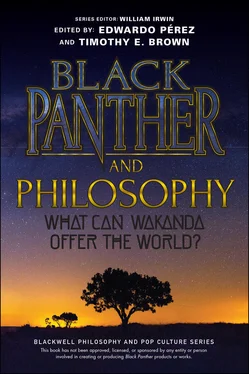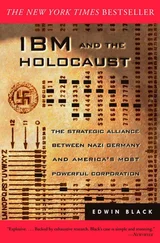Black Panther and Philosophy
Здесь есть возможность читать онлайн «Black Panther and Philosophy» — ознакомительный отрывок электронной книги совершенно бесплатно, а после прочтения отрывка купить полную версию. В некоторых случаях можно слушать аудио, скачать через торрент в формате fb2 и присутствует краткое содержание. Жанр: unrecognised, на английском языке. Описание произведения, (предисловие) а так же отзывы посетителей доступны на портале библиотеки ЛибКат.
- Название:Black Panther and Philosophy
- Автор:
- Жанр:
- Год:неизвестен
- ISBN:нет данных
- Рейтинг книги:4 / 5. Голосов: 1
-
Избранное:Добавить в избранное
- Отзывы:
-
Ваша оценка:
- 80
- 1
- 2
- 3
- 4
- 5
Black Panther and Philosophy: краткое содержание, описание и аннотация
Предлагаем к чтению аннотацию, описание, краткое содержание или предисловие (зависит от того, что написал сам автор книги «Black Panther and Philosophy»). Если вы не нашли необходимую информацию о книге — напишите в комментариях, мы постараемся отыскать её.
Black Panther and Philosophy: What Can Wakanda Offer The World
Black Panther
Black Panther and Philosophy
Black Panther and Philosophy — читать онлайн ознакомительный отрывок
Ниже представлен текст книги, разбитый по страницам. Система сохранения места последней прочитанной страницы, позволяет с удобством читать онлайн бесплатно книгу «Black Panther and Philosophy», без необходимости каждый раз заново искать на чём Вы остановились. Поставьте закладку, и сможете в любой момент перейти на страницу, на которой закончили чтение.
Интервал:
Закладка:
“Burn It All”
One of the functions that tradition can serve in a society is as a guard against absolute and arbitrary power. In Britain during Burke’s time, for example, the monarchy had a lot of power, but it didn’t rule unchecked. The political and social traditions that had built up in England over centuries helped to balance the power of the monarch against the power of Parliament and against what Burke called the “entailed inheritance” 4of the people’s rights and liberties. The monarch might have had more power than a farmer, but the fact that both the king and the farmer lived within the same tradition meant that the farmer enjoyed liberties that he wouldn’t have under a capricious ruler. It meant that the king didn’t have arbitrary and unrestrained power.
We see this kind of tradition at work in Wakanda, as well. The coronation ceremony, for example, helps to instill humility in the king, reminding him that he is responsible to the tribes for his actions. In fact, the Challenge Day ritual suggests that though Wakanda’s monarchy is inherited, the king also serves by consent of the people. We see this in the fact that T’Challa must have the strength of the Black Panther stripped from his body before he can engage in ritual combat with a challenger to the throne. This levels the playing field and makes it possible for a challenger to actually succeed. Though it is probably not written in law, this custom protects the people from the whims of capricious and arbitrary rulers.
From his first appearance in Wakanda, Killmonger shows that he does not care about the traditions that guarantee order and liberty in the nation that he wants to rule. This is why his brief time in power causes so much harm and threatens to destroy the very fabric of Wakandan society. He says that he wants to use Wakanda’s vibranium and weapons to “liberate” the billions of people around the world who are of African descent, letting Wakanda serve as “judge, jury, and executioner” for oppressive people in other places. Moreover, he clearly has no interest in the customs that guarantee a peaceful, orderly, and fair transfer of power. When the leader of the River Tribe says that “it will take weeks” to arrange a new challenge, Killmonger says, “Weeks? I don’t need weeks. The whole country ain’t gotta be there.” In other words, he isn’t interested in the tribes having their say in the rule of Wakanda; he only wants the power to do what he believes is right – for everyone in the world.
Perhaps his worst offense against Wakanda’s traditions comes just after he has consumed the Heart-Shaped Herb and gained the strength of the Black Panther. One of the women who attend him during the process says that they preserve the garden of the Herb “so that when it comes time for another king, we will be ready.” Killmonger scoffs and says, “Another king? Yeah, go ahead and burn all that.” The woman appeals to tradition, saying that she cannot burn the Herb, and Killmonger viciously grabs her by the throat, lifting her from the ground: “When I tell you to do something, I mean that shit.” In other words, he is limited by no custom, tradition, or sentiment. His power is unchecked and arbitrary.
It’s hard to tell whether Killmonger doesn’t see the likely results of destroying the Heart-Shaped Herb or if he simply doesn’t care. But it is clear that the consequences won’t be good. Even though Wakanda is protected by the Border Tribe and by its advanced technology, its primary defender is the Black Panther, whose strength comes solely from the Herb. Unless some new source of the Herb is found before T’Challa dies, he will be the last of the Black Panthers. Worse, the destruction of the Herb might not bode well for the next transfer of power. Kingship in Wakanda is closely associated with the role of the Black Panther. The loss of that role will probably have a ripple effect on other aspects of Wakandan tradition. When the time comes for a new king, the other tribes might wonder what makes the royal family special without the Heart-Shaped Herb. They might wonder why a Challenge Day ritual is even necessary at all, and once they begin to wonder about that, tribal strife will probably erupt. In other words, the peace and social cohesion that Wakanda has developed over millennia could be destroyed by a single man who thinks that he knows better than Wakanda’s traditions.
“What Has Happened to Our Wakanda?”
After Killmonger throws T’Challa over the waterfall during their ritual combat and assumes power, Wakandan society finds itself torn in two. Nakiya, a Wakandan spy, and Okoye, a member of the Dora Milaje, find themselves at odds about what it means to be loyal to Wakanda. Nakiya asks Okoye to help her overthrow Killmonger “before he becomes too strong.” Okoye will have none of it: “I am loyal to the throne, no matter who sits upon it!” Knowing how important Wakanda’s traditions are to the stability and peace of the nation, she is desperate to protect those traditions. “You serve your country,” she says, and Nakiya replies, “No, I save my country.”
The disagreement between the two women speaks to one of the gravest consequences of revolutions like Killmonger’s. Though each woman loves her country, Killmonger drives a wedge between them over how to best serve Wakanda. To the dutiful Okoye, serving Wakanda means serving a king she despises in the hope that she can maintain order in her country and usher it through a difficult time. To Nakiya, patriotism requires her to fight a man whose rule might be technically legitimate, but who blatantly opposes everything that Wakanda holds sacred. For a time, this means that two close friends find themselves on opposite sides of a conflict.
The wedge drives deeper, however. The Border Tribe happily embraces Wakanda’s new king, aiding him in preparing to wage war on the rest of the world. This leads to Wakandans hurting and killing their own people. As W’Kabi says in a deleted scene, “There will be war and death, but in the end it will be beautiful.” In helping Killmonger, the Border Tribe causes outright civil war – a war that alienates friends, spouses, and countrymen.
“Just Because Something Works …”
Those who are loyal to Wakanda have to oppose Killmonger with force, but what truly brings order and peace back to Wakanda is a reassertion of the traditions and customs that have shaped Wakandan society for millennia. Having stolen a single Heart-Shaped Herb from the garden before Killmonger had it burned, Nakiya flees with Shuri and Ramonda to the Jabari Tribe in the mountains. In her desperation, she intends to give the Herb to M’Baku so that he can have the strength to overthrow the new king. What she doesn’t know is that M’Baku recovered T’Challa’s comatose body after Killmonger threw him over the waterfall.
A man less devoted to the traditions of his country might accept the Herb and take advantage of the chaos in Wakanda in order to advance his own power, but instead, M’Baku allows the women to use the Herb to revive their comatose king. So, the man who seemed backward in his traditionalism at the beginning of the film turns out to be the key not only to the restoration of peace in Wakanda, but also to saving the world from Killmonger’s murderous revolution.
Moreover, when T’Challa recovers from the coma and returns to the Vibranium Mound to oppose Killmonger, he legitimizes his actions by asserting that the ritual combat isn’t over: “I never yielded, and as you can see, I am not dead!” Killmonger and the Border Tribe reject this reasoning, of course, but when the Dora Milaje and others see that Killmonger doesn’t yet have a rightful claim to the throne, they join T’Challa in stopping him from sending Wakandan weapons across the border and beginning a war on the rest of the world.
Читать дальшеИнтервал:
Закладка:
Похожие книги на «Black Panther and Philosophy»
Представляем Вашему вниманию похожие книги на «Black Panther and Philosophy» списком для выбора. Мы отобрали схожую по названию и смыслу литературу в надежде предоставить читателям больше вариантов отыскать новые, интересные, ещё непрочитанные произведения.
Обсуждение, отзывы о книге «Black Panther and Philosophy» и просто собственные мнения читателей. Оставьте ваши комментарии, напишите, что Вы думаете о произведении, его смысле или главных героях. Укажите что конкретно понравилось, а что нет, и почему Вы так считаете.












